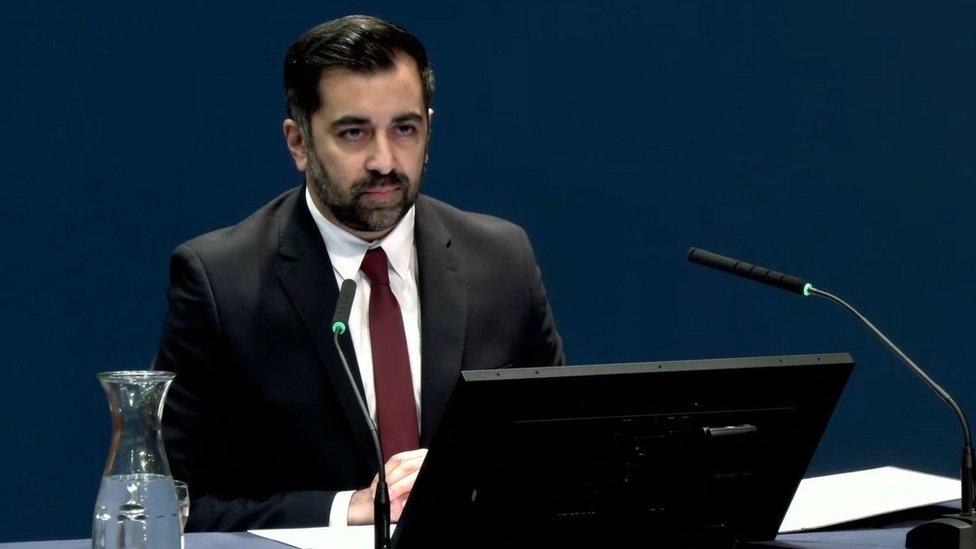Covid Inquiry: Alister Jack deleted WhatsApps to 'free up storage'
- Published
Sturgeon could 'cry from one eye if she wanted' - UK minister
Scottish Secretary Alister Jack deleted all of his WhatsApps from during the pandemic, the UK Covid Inquiry has heard.
The Conservative minister said he erased his files to free up storage capacity on his phone in November 2021.
He expressed "regret" and said he would have not done so if he could "turn the clock back".
Mr Jack also said he did not believe Nicola Sturgeon when she denied trying to politicise the pandemic.
Ms Sturgeon and other senior figures from the Scottish government have been criticised for deleting messages sent during key phases of the crisis despite the former first minister giving an assurance to Channel 4 News, external in August 2021 that she would disclose them.
Asked about his own WhatsApps, Mr Jack said he was not aware of any mobile messaging policies applying to UK government ministers at the time and had not considered retaining them to help him recall events from the pandemic.
He told the inquiry: "I didn't delete some of my WhatsApp messages, I deleted all of them."
But he insisted he deleted no messages related to government business because he did not conduct business via WhatsApp.
Asked by Claire Mitchell KC on behalf of the Scottish Covid Bereaved group if he had any thoughts about keeping the messages, he replied: "No, because I was keen for my phone to start working again.
"More importantly I knew that I did no government decisions by WhatsApp and that will be borne out by WhatsApps from ministers you do have. That is something I was not in the habit of doing."
Mr Jack described himself as a "bit of a Luddite", adding: "If I could turn the clock back knowing what I know now, I would have sought a different solution for my lack of storage capacity."
He said he regretted deleting his "entire account" because of the inquiry, and also because he "hadn't saved some family pictures and bits and pieces".
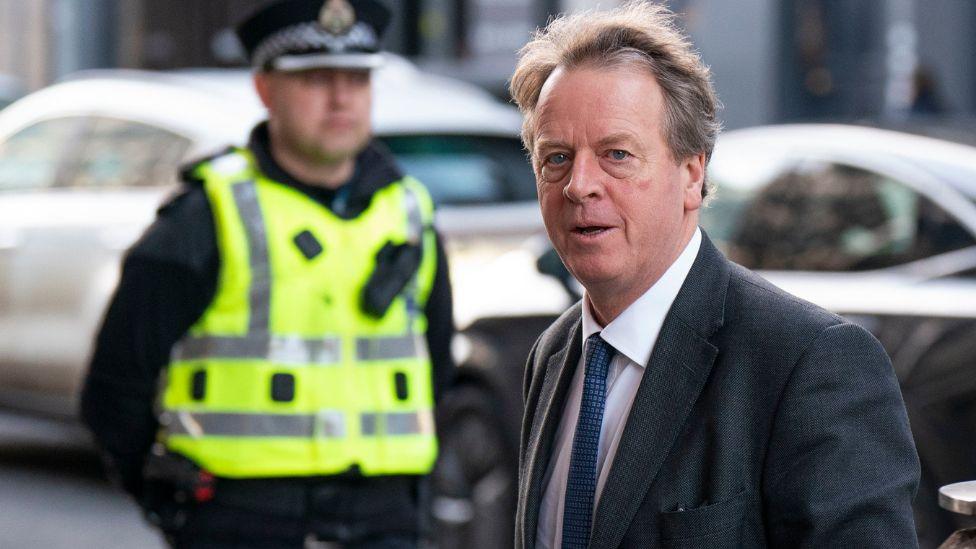
Scottish Secretary Alister Jack denied the relationship between Holyrood and Westminster was akin to "children squabbling with each other".
In her evidence on Wednesday, Ms Sturgeon rejected claims from UK government minister Michael Gove that the Scottish government sought "political conflict" during the pandemic.
Becoming emotional, she insisted "the idea that in those horrendous days, weeks, I was thinking of political opportunity" was "not the case".
Mr Jack told the inquiry that he "didn't believe it for a minute".
He added: "I looked at her performance and thought she could cry from one eye if she wanted to."
Mr Jack claimed tensions between the UK and Scottish governments were "inevitable" because Ms Sturgeon "saw her job as leader of a nationalist government to break up the UK".
He continued: "Devolution works very well but works very well when both governments want to work together.
"But when one government wants to destroy the UK and destroy devolution, then there are tensions."
Mr Jack said the Scottish government diverged with the rest of the UK on Covid rules "for the sake of it" - citing its five levels system of restrictions, compared to the UK government's three-tier system.
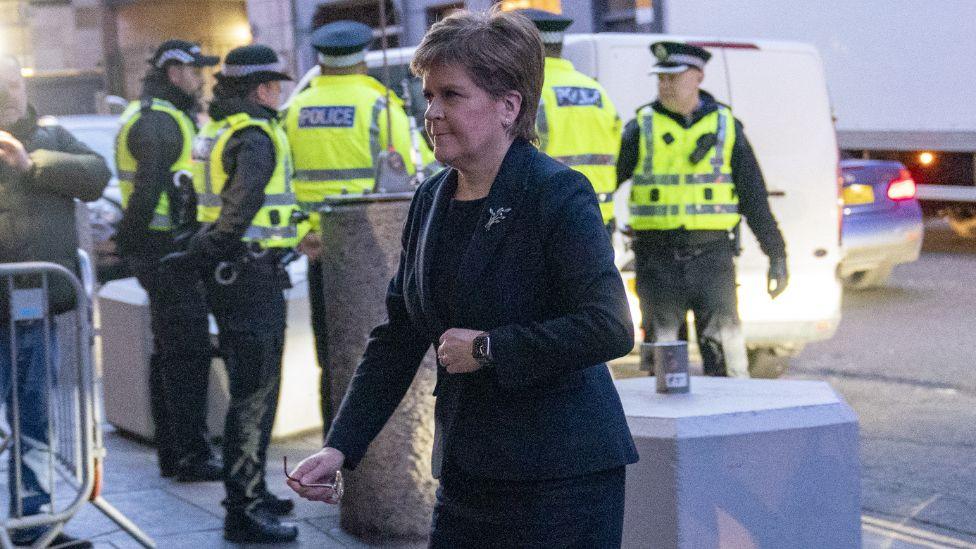
Former first minister Nicola Sturgeon became emotional during her testimony to the UK Covid Inquiry
He described Scotland's system as "farcical", claiming it "achieved nothing" and "unnecessarily" affected hospitality businesses and the economy.
The Scottish secretary said that following meetings with the UK government, Scottish government figures would "absorb the information but then worked out how they could do it but just slightly differently".
"I felt that was a political manoeuvre on their behalf," he added.
'Mistrust baked into system'
Scottish government figures have previously told the inquiry they were caught off guard by Downing Street changing decisions with little or no notice.
Referencing Downing Street's decision in May 2020 to update coronavirus messaging from "stay at home" to "stay alert", Mr Jack expressed regret and said the Scottish government had a "fair point".
However, he said that mistrust was "baked into the system" and accused Ms Sturgeon of breaching the memorandum of understanding with the UK government following a Cobra meeting in March.
He also claimed the Scottish government did not reveal an outbreak at a Nike conference at the start of the pandemic in February 2020.
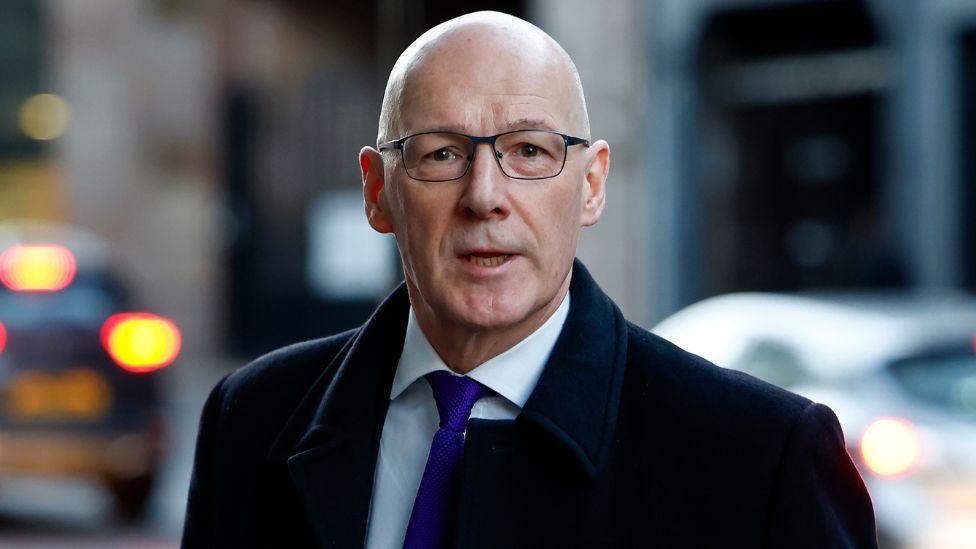
Former deputy first minister John Swinney criticised the Scottish secretary in his evidence to the inquiry
Earlier this week, former deputy first minister John Swinney told the inquiry Mr Jack, unlike his predecessor as Scottish secretary David Mundell, was not a "help" to the Scottish government.
Mr Swinney said there was "no real value" in engaging Mr Jack about decision making during the pandemic.
Mr Jack said this was "absolutely not" accurate.
He told the inquiry he was not on Mr Swinney or Ms Sturgeon's Christmas card list and had been embroiled in several court battles with the Scottish government.
Mr Jack said his position as Scottish secretary was not respected by Scottish government ministers, adding: "They don't like the Scotland Office and they don't like my powers."
He went on to accuse the Scottish government of creating a "manufactured grievance" over the UK government's furlough scheme in late 2020 amid concerns it would be required to facilitate a winter lockdown in Scotland.
Asked if he believed if Holyrood did not have the right to close the border between Scotland and England during the pandemic, the Scottish secretary said he felt the "whole border thing" was a ploy to portray Scotland as "a separate country, a land apart".
He denied suggestions from inquiry counsel Jamie Dawson KC that the relationship between the governments was akin to "children squabbling with each other".
'Massive difference'
At First Minister's Questions, Scottish Tory leader Douglas Ross said Mr Jack was "wrong" to delete his messages but said that was not equivalent to deletions by Scottish ministers.
"He has apologised and he regrets it. Humza Yousaf can't step out the shadow of his disgraced predecessor and say the same," he told MSPs.
He said there was a "massive difference" between the Scottish secretary and Ms Sturgeon, who said she deleted messages in line with government policy.
Mr Yousaf said the government "could have and should have done better" on retaining informal messages.
He also said it was "absolute fantasy" to claim the Scottish government made decisions during the pandemic based on reasons other than to protect the population from harm.
- Published31 January 2024
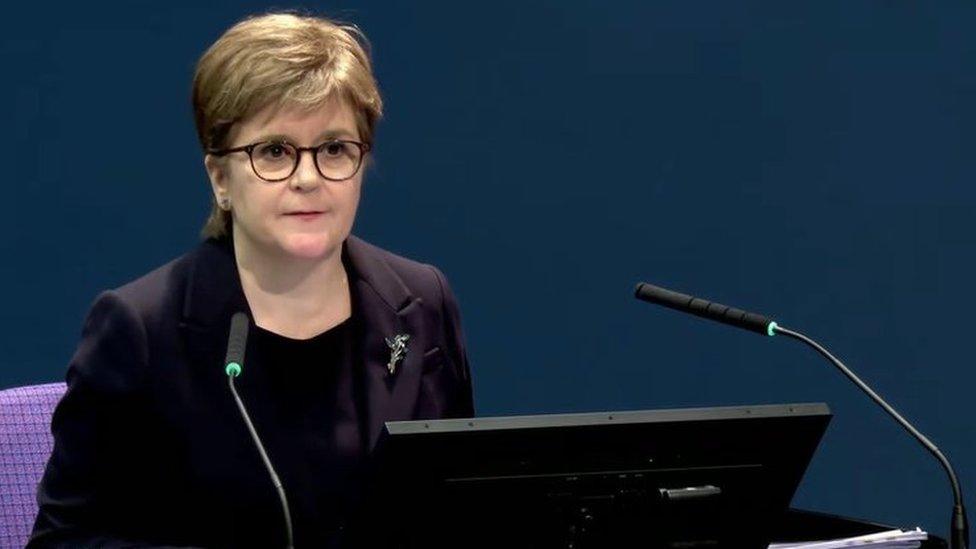
- Published29 January 2024
